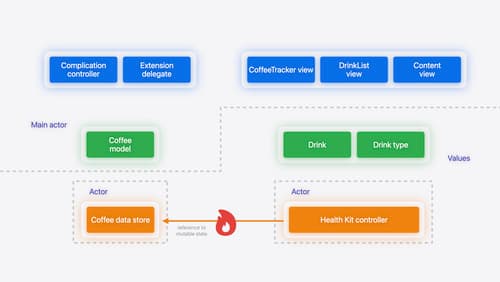Migration swift 6
Asked on 2024-08-12
1 search
To migrate to Swift 6, there are several key aspects to consider, as discussed in the WWDC sessions:
-
Data-Race Safety: Swift 6 introduces a new language mode that enforces data-race safety, which is a significant update. This mode is opt-in, allowing you to adopt it when you're ready. You can enable it module by module, even if some dependencies haven't migrated yet. The compiler diagnostics will guide you in identifying and fixing potential issues, acting like a pair programmer to point out potential bugs in your code. This is discussed in the session Migrate your app to Swift 6.
-
Concurrency Features: Swift 6 includes improvements to concurrency, such as complete concurrency checking. This is a per-module setting that allows you to enable warnings for code that would fail with Swift 6's enforced data isolation. Once you resolve these warnings, you can enable Swift 6 mode to lock in changes and prevent regressions. This process is detailed in the session Migrate your app to Swift 6.
-
Migration Guide: Swift.org provides a migration guide with insights and patterns to help modify your code for Swift 6. This guide is a valuable resource for ensuring a smooth transition and is mentioned in the session Platforms State of the Union.
-
Swift Testing: An all-new testing framework, Swift Testing, has been introduced, which offers expressive APIs to simplify writing tests. This is part of the broader improvements in Swift 6 and is covered in the session Platforms State of the Union.
For a comprehensive understanding of the migration process and new features in Swift 6, you can refer to the sessions "Migrate your app to Swift 6" and "What’s new in Swift."

What’s new in SwiftData
SwiftData makes it easy to add persistence to your app with its expressive, declarative API. Learn about refinements to SwiftData, including compound uniqueness constraints, faster queries with #Index, queries in Xcode previews, and rich predicate expressions. Join us to explore how you can use all of these features to express richer models and improve performance in your app. To discover how to build a custom data store or use the history API in SwiftData, watch “Create a custom data store with SwiftData” and “Track model changes with SwiftData history”.

Migrate your app to Swift 6
Experience Swift 6 migration in action as we update an existing sample app. Learn how to migrate incrementally, module by module, and how the compiler helps you identify code that’s at risk of data races. Discover different techniques for ensuring clear isolation boundaries and eliminating concurrent access to shared mutable state.

Track model changes with SwiftData history
Reveal the history of your model’s changes with SwiftData! Use the history API to understand when data store changes occurred, and learn how to use this information to build features like remote server sync and out-of-process change handing in your app. We’ll also cover how you can build support for the history API into a custom data store.
